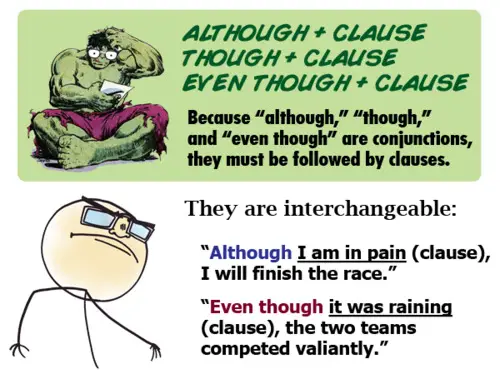
Though these are common words, questions crop up now and then about though, although, in spite of, and despite. One thing is for certain: these words are similar in meaning. The difference lies in the fact that they are different parts of speech.
Let’s take a look at though and although first. They are conjunctions and can be used interchangeably as such.
The government says the economy is improving, although people do not seem to feel it.
Replacing although with though does not change the meaning.
The government says the economy is improving, though people do not seem to feel it.
How about starting a sentence with these two words? You may have heard/read people stating adamantly that it is not correct to do that, but there really is no reason not to. We can give example after example to illustrate this, but this example from Merriam-Webster should be more than enough. ((Merriam-Webster))
Though they know the war is lost, they continue to fight. — Bruce Bliven †1977
Here’s a quick note about another function of though – it can also function as an adverb. In this case, though cannot be interchanged with although.
I have so much work to finish. I like it that way, though.
How about in spite of and despite? Where do they come into the picture? As I said earlier, they can be used in lieu of the other two words. The structure has to be different, however, since these words are prepositions and not conjunctions. As such, if you want to use in spite of or despite, a noun has to follow.
To end, here’s a quick guide.
though + clause
although + clause
despite + noun
in spite of + noun
Image via The Yuniversity

Leave a Reply